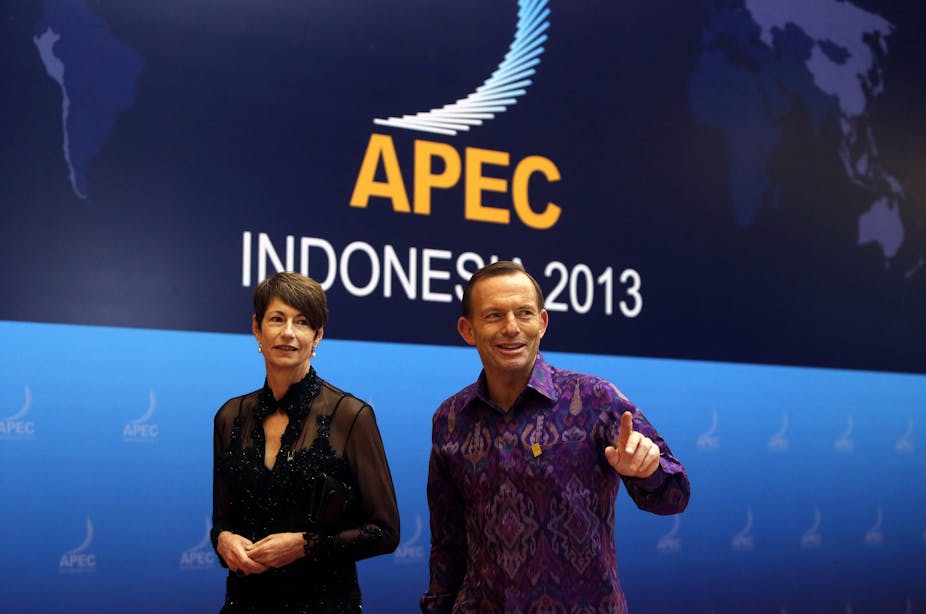It is barely a decade old, but some pundits are already declaring the end of the “Asian century”. The Abbott government appeared ready to bury it after the recent archiving of the Gillard government’s much-touted Australia in the Asian Century white paper. Even the internet version has been laid to rest in the cyber cemetery of the National Library of Australia’s web archive.
Yet the Abbott government’s early activities in office suggest that the Asian century is far from being dead, buried and cremated. In fact, it is an increasingly important political reality.
The early days of the Abbott government
Abbott’s days as a greenhorn prime minister were spent on an “amazing Asian Adventure” - first at the APEC summit in Jakarta and then the East Asia Summit in Brunei. He spruiked foreign policy approaches which embraced a pivot to “Jakarta not Geneva”, while softening his controversial anti-people smuggling campaign in a bid to strengthen the Australia-Indonesia relationship.
Meanwhile, foreign minister Julie Bishop has been a frequent flyer in the region, pursuing a sweeping southeast Asian agenda. This is while seeking a trifecta of free trade agreements with China, Japan and South Korea. In a statement released in advance of her swearing-in as foreign minister, Bishop is quoted as saying:
It is vital that Australia’s foreign policy is positioned to take advantage of the global shift in economic power to Asia.
While in opposition, Bishop was a vocal supporter of “Asia literacy” in the form of mandatory school language programs. In office, she is pursuing the “grand initiative” of a new Colombo Plan in which Australian students’ endeavours into Asia will be so integral to their tertiary education experience as to be a “rite of passage”.
This appears less like evidence of an about-turn in government policy and more like new rhetoric for a similarly Asia-focused agenda. But why should we care about the government’s semantic machinations?
Geopolitical, cultural and financial shifts towards Asia will influence far more than Australia’s foreign policy. The Asian century also has widespread social, cultural and domestic policy implications, especially through its potential to influence intercultural relations, alter the context of public policy, and shape the way we address global challenges like climate change.
The globalising processes on the horizon for this century - whatever we deem to call it - will transform how we define public policy, how it is implemented and how it is managed.
Asian century and public policy
From New York City to Birmingham to Melbourne, public servants and policy scholars are busy determining the skills and competencies vital to effective and efficient 21st century public service. Shortly before its demise, the previous government dedicated A$35 million to establishing a National Centre for Asia Capability, aimed at improving competencies for business and government throughout Australia.
Importantly, and as argued previously, the capabilities and values which come to define the 21st century public servant must subvert the usual “West to the rest” model. Instead, Australian and other Western public administrations could benefit greatly from consideration and integration of select values and practices honed by Asian nations over centuries, not decades.
China’s original civil service examination, for example, dates back to circa 600 AD. This is not to suggest that the way to improve Australia’s future public administration is by encouraging public service hopefuls to sharpen their pencils and prepare their bluebooks.
Instead, it is an illustrative reminder of the depth and experience of public service culture in Asia. It is for this reason that the education of future public servants is beginning to integrate regional and global perspectives and non-Western approaches.

At the same time, it is vital that Australia does more than simply replicate “the key lessons from Asia”. All public administration systems are products of their own particular history and tradition, and any good analyst knows that lessons cannot simply be transferred. Rather, they must be tested and adapted for a new context. This is what all successful public administration systems do constantly. In fact, it is one of the reasons that Australia’s public service is so highly regarded internationally.
Today, more evidence is available about the merits of different public service systems in Asia. More scholars are writing about them in mainstream journals and media, and more space is being created for these ideas in high-profile forums, including TED Talks.
Such contributions offer some challenging perspectives on vital policy issues. These include the privileging of age and experience over youth and ideas, the valuing of collective interest over self interest, and the prioritisation of long-term planning over short-term satisfaction.
Getting beyond the rhetoric to the reality and exploring the contribution of these ideas and others to future public administration is critical to ongoing foreign and domestic policy success for Australia. Debates and discussions will further identify new opportunities for research and policy exchange about good public administration in a global context.
Clearly, the Asian century remains a critical concern for public administration, policy and governance. From recent government actions to professional development of Australia’s public servants, research agendas and the education of future public managers, Asia’s development endures as a central concern.
Whatever language you speak or choose, the Asian century is just beginning.
The University of Melbourne’s School of Government will host the Public Policy in the Asian Century conference on December 9-10.

